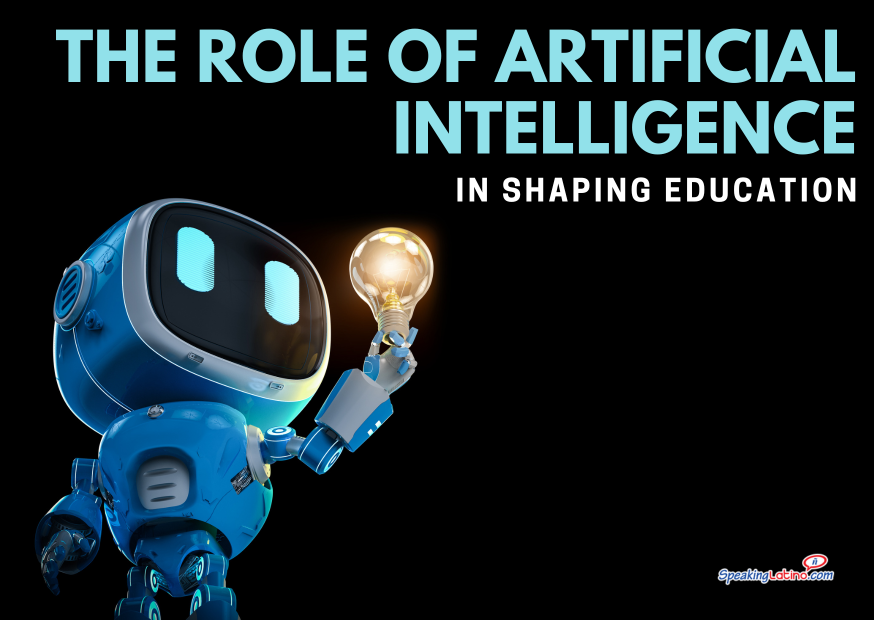
The content of this article is based on the presentation, Artificial Intelligence in Education: A Generational Perspective by Knikki Hernández, which was part of the World Language Teacher Summit.
The Advent of AI in Generational Learning
Artificial Intelligence (AI) stands at the forefront of educational transformation, bringing about pivotal changes in the way knowledge is disseminated and how learning experiences are crafted. The impact of AI in education has been profound and is viewed differently across generational lines, from Gen X and Baby Boomers to Millennials and Gen Zers. Each group brings their unique perspectives, informed by distinct cultural, societal, and technological experiences. This generational divide is not merely an academic curiosity but a lens through which the future of education must be understood and shaped.
Generational Dynamics and AI Comprehension: Understanding AI Utilization Across Ages
Depending on one's generational affiliation, the utilization of AI in the educational sphere presents various levels of comfort and understanding. An environment rich with Gen X teachers and Baby Boomers may witness a range of responses to AI, from enthusiasm to skepticism. In the midst of such a cohort, Millennials and the sparse Gen Zers navigate these waters with their paradigms, where the latter may find themselves perplexed by AI, highlighting a concerning gap in AI literacy.
Millennials: The AI Idealists Turned Realists
Millennials, having grown alongside the burgeoning internet and personal computing revolution, perceive AI as a natural progression in the tech-savvy ethos of their generation. This group forecasts a landscape where AI's ubiquity in schools is akin to the proliferation of the personal computer, changing paradigms and creating new avenues for income and efficiency in everyday life. However, this enthusiasm is tempered by a gradual shift from idealism to a more cynically pragmatic view of technology.
AI and Socioeconomic Implications: The Great Equalizer or Divider?
Amidst the potential and promises, AI's influence on socioeconomic disparities cannot be ignored. While some argue that AI could democratize education, affording tailored learning experiences to students of all backgrounds, there is a poignant question as to whether it may further exacerbate existing divides. This calls for a thoughtful interrogation of AI's role in fostering inclusivity rather than perpetuating privilege.
The Generational AI Outlook in the US: Optimism Meets Cautious Pessimism
An exploration of generational attitudes reveals that while Millennials are the most optimistic about AI's potential, Gen Z exhibits caution, overshadowed by uncertainties pertaining to their societal roles and educational sufficiency. These anxieties are compounded by perceived inadequacies from the very systems designed to prepare them for the future. This discrepancy between generational outlooks necessitates a nuanced approach to integrating AI into educational frameworks.
Gen Z in the Workforce: Finding a Balance
A generation advocating for work-life balance finds both support and criticism in its aspirations. It is posited that the emphasis on not working might be a disservice in the long term. Educational institutions, hence, bear the responsibility of equipping Gen Z with the necessary learning experiences and opportunities to thrive in an AI-infused future.
AI's Role in Evolving Communication Patterns: Enhancing Connectivity Between Educators and Students
Teachers and parents are progressively turning to AI to streamline communication, presenting possibilities for increased student involvement. This fosters a community where information and feedback loops are enhanced through AI-mediated channels, potentially engendering a more cohesive and responsive educational environment.
Strategic Integration of AI in Schools
For AI's role in education to be beneficial and ethical, administrative bodies must envision and enact clear policies, provide adequate training to educators, and establish boundaries to mitigate risks. The managerial echelons within the educational system play a pivotal role in guiding this integration to ensure AI is a tool that empowers rather than impedes.
Potential Perils of AI in Personalized Learning: The Challenge of Individual Thinking
While AI has the power to tailor content to individual learning trajectories, concerns arise regarding the narrowness of personalized content streams and the impact on social media influence. The delegation of cognition to AI systems might contribute to a relinquishing of critical and individual thought, whereby one's intellectual autonomy is at stake.
AI and the Next Generation
Looking forward, Gen Alpha is predicted to capitalize on AI and virtual realities, potentially opting for the latter over tangible experiences. This generation stands at a crossroads as potential pioneers in AI and content creation, but also passengers in a preconstituted tech-dominated landscape.
Generation-Specific AI Utilization: From Passive Consumption to Active Creation
AI's application varies across generational milieus, where the context, such as in the creation of virtual realities like malls and VR stores, reflects Gen Alpha's expected dualistic engagement with both the digital and physical worlds.
Legal and Ethical Conundrums of AI Ownership: Mitigating Misuse in Academic Settings
The rise of AI has sparked discussions about legal and ethical conundrums, from bypassing digital paywalls to potential misuse by students. Educational systems must grapple with these challenges, ensuring that AI complements learning without undermining academic integrity or legal frameworks.

Connectivity and digital tools play a central role in daily life for Gen Z
AI's Synergy with Educators: Bernard Marr's Insights
The perspective that AI will replace teachers is contested, as experts like Bernard Marr stipulate that its role is supplementary. AI's capacity to foster personalized learning experiences and relieve teachers of administrative burdens offers an optimistic view of the symbiosis between educators and intelligent systems.
Lifelong Learning and AI: A Future Vision
As learners navigate various life stages, AI's role in providing universal access to learning experiences, customization, and support for lifelong educational pursuits becomes evident. This vision highlights AI's transformative potential in both the student's journey and the evolution of teaching methodologies.
Navigating the Mental Health Landscape
The prevalence of anxiety and depression among Gen Z, and the accompanying rise in mental health medication, is a stark reminder of the need for comprehensive support mechanisms. As AI becomes interwoven with educational systems, its potential to either alleviate or exacerbate these mental health issues warrants careful consideration.
Hybrid Generations and AI Integration: The Zer-Millennial Phenomenon
Individuals born at the juncture of generational boundaries, known as 'hybrid students' or 'zer-millennials,' may experience a unique blend of generational attributes. This cross-pollination suggests a potentially more adaptable and well-rounded approach to AI, combining the respective strengths and tempering the pitfalls associated with each generation's engagement with technology.
FAQs about Artificial Intelligence in Education
How do generational attitudes towards AI influence its potential impact on the education system?
Generational attitudes towards AI play a significant role in shaping its potential impact on the education system. For example, the cautious nature of Gen Zers towards AI may impact their willingness to embrace new technological tools in learning environments . On the other hand, Millennials' optimistic view of AI as a great equalizer that can create more opportunities in education suggests a more open mindset towards integrating AI into the classroom . Understanding these generational perspectives can help educators tailor their approach to implementing AI technologies in education, considering the varying levels of acceptance and readiness among different age groups . By addressing these attitudes and concerns, educators can leverage AI to enhance teaching practices, personalize learning experiences, and better prepare students for the digital future.
What role do Millennials, Gen Xers, Gen Zers, and Gen Alphas play in shaping the future of AI in education?
Millennials, Gen Xers, Gen Zers, and Gen Alphas each play a unique role in shaping the future of AI in education:
- Millennials: With their positive outlook on AI and eagerness to utilize technology to save time and enhance productivity, Millennials are likely to drive the adoption of AI in educational settings. Their perspective on AI as a great equalizer and a tool for creating more opportunities can influence how AI is integrated into teaching practices and learning environments .
- Gen Xers: Gen Xers tend to view AI as a tool for self-improvement and personal development. Their approach to using AI to enhance their skills and capabilities can contribute to the implementation of AI-driven educational solutions that focus on upskilling and professional growth. Gen Xers' pragmatic attitude towards technology can guide the strategic integration of AI in educational institutions.
- Gen Zers: Gen Zers, being digital natives, have a cautious attitude towards AI, possibly due to concerns about job displacement and uncertainties about the technology's impact on their future . Their awareness of personal deficiencies and challenges in a rapidly changing world can influence how AI is introduced in educational settings, emphasizing the need for comprehensive support and guidance in utilizing AI tools effectively.
- Gen Alphas: As the youngest generation, Gen Alphas are growing up in a world where AI is increasingly prevalent. Their early exposure to AI technologies and digital tools will shape their expectations and interactions with AI in education. Educators and policymakers need to consider the unique learning preferences and digital fluency of Gen Alphas when designing AI-powered educational experiences to ensure relevance and engagement.
By understanding the perspectives and preferences of Millennials, Gen Xers, Gen Zers, and Gen Alphas, educators and stakeholders can collaboratively design AI-driven educational initiatives that cater to the diverse needs and expectations of learners across different generations, ultimately shaping the future of AI in education.

Understanding generational patterns help educators in adapting teaching methods to meet the evolving needs of students across different age groups
What are some potential benefits of integrating AI into the education system?
Some potential benefits of integrating AI into the education system, include:
- Personalized Learning: AI technologies can analyze individual student data and learning patterns to provide personalized recommendations and adaptive learning experiences tailored to each student's needs and preferences .
- Enhanced Teaching Practices: AI tools can assist educators in creating interactive and engaging learning materials, automating administrative tasks, and providing real-time feedback to improve teaching effectiveness and efficiency .
- Improved Student Outcomes: By leveraging AI for data analysis and predictive modeling, educators can identify at-risk students, track their progress, and intervene early to support their academic success and overall well-being .
- Accessibility and Inclusivity: AI-powered tools can help bridge the digital divide by providing access to educational resources and support for students with diverse learning styles, abilities, and backgrounds .
- Innovation and Future Readiness: Integrating AI into the education system can prepare students for the digital workforce by equipping them with essential skills such as critical thinking, problem-solving, and technological literacy needed in the 21st-century job market .
By harnessing the potential benefits of AI in education, schools and educators can create more engaging, personalized, and effective learning experiences that empower students to succeed in an increasingly digital and interconnected world.
Embracing a Generational Tapestry in AI Education
Education systems equipped with AI have an unprecedented opportunity to cater to the rich tapestry of generational needs, aspirations, and values. The responsibility lies in crafting educational models that recognize the potential and challenges AI brings, ensuring all generations can navigate the digital terrain with confidence and competence. As the discourse on AI in education continues to evolve, acknowledging and respecting each generation's contribution will be pivotal for a harmonious and progressive educational future.